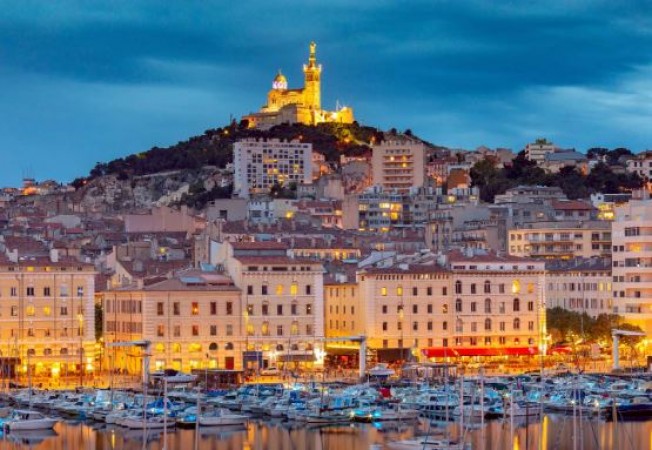
Marseille is located the sun-kissed coastline of the Mediterranean Sea, Marseille stands as a city of immense historical significance, cultural diversity, and captivating charm. As the second-largest city in France and the capital of the Provence-Alpes-Côte d'Azur region, Marseille boasts a rich and storied past that dates back over 2,600 years. This coastal metropolis has long been a crossroads of civilizations, witnessing the rise and fall of empires, influencing art and literature, and developing its unique character through the fusion of different cultures. With its picturesque landscapes, bustling harbors, iconic landmarks, and mouthwatering cuisine, Marseille has cemented its position as an alluring destination that lures visitors from all corners of the globe.
Also Read: Nice, France: A Mediterranean Gem
Marseille's origins can be traced back to ancient Greek settlers who founded the city in 600 BC. They named it "Massalia," and its strategic location on the Mediterranean coast allowed it to flourish as a prosperous trading hub. Over the centuries, Massalia experienced the rule of various civilizations, including the Romans, Visigoths, and Franks, all of whom left their marks on the city's architecture and culture. In the 19th century, Marseille underwent a significant transformation during the Second Industrial Revolution, solidifying its status as a major maritime and industrial center in France.
Also Read: The French Riviera: A Mediterranean Jewel of Elegance and Charm
One of the defining features of Marseille is its remarkable cultural diversity. The city has been shaped by waves of immigration from different parts of the Mediterranean basin and beyond. The French, Italian, and North African influences blend seamlessly, making Marseille a true melting pot of cultures. Visitors can explore the vibrant neighborhoods like Le Panier, Noailles, and La Plaine, each offering a unique ambiance and showcasing the rich tapestry of its inhabitants' backgrounds. This cultural fusion is also evident in the local cuisine, which is heavily influenced by Mediterranean flavors, with dishes like bouillabaisse, a traditional fish stew, and pastis, an anise-flavored liqueur, taking center stage.
Marseille boasts a plethora of iconic landmarks that bear witness to its historical significance and architectural brilliance. The Vieux-Port (Old Port) serves as the heart of the city, offering breathtaking views of colorful fishing boats, impressive yachts, and the iconic Notre-Dame de la Garde Basilica perched high on a hill, watching over the city like a guardian. The basilica, with its striking Neo-Byzantine architecture and gilded statue of the Virgin Mary, is a must-visit site that provides panoramic vistas of the city and the sea.
Also Read: Folk Dance of France: Vibrant Rhythms and Elegance
The MuCEM (Museum of European and Mediterranean Civilizations) is another architectural marvel. Designed by Rudy Ricciotti, the museum combines a modern cube with a historic fort, symbolizing Marseille's ability to blend the old with the new. The Palais Longchamp, an impressive 19th-century monument, is another must-see landmark, featuring a monumental fountain, beautiful gardens, and the Museum of Fine Arts and Natural History.
Marseille's cultural scene is as diverse as its population. The city boasts a vibrant arts community with numerous galleries, theaters, and performance spaces. The International Documentary Film Festival, held annually in Marseille, attracts filmmakers and enthusiasts from around the world. Music is also deeply ingrained in the city's culture, with traditional folk festivals and modern music events keeping the rhythm alive. Street art is yet another expression of Marseille's creative spirit, with colorful murals adorning buildings throughout the city, adding to its bohemian charm.
Also Read: Lyon, France: A Gastronomic Journey
Nature lovers will find solace in Marseille's proximity to the Calanques National Park. Located just outside the city, this natural wonder is a breathtaking collection of limestone cliffs, hidden coves, and crystal-clear waters. Visitors can hike, rock climb, or take a boat tour to explore the stunning landscapes and abundant wildlife of the area. The Calanques offer an excellent escape from the bustling city, providing a serene retreat into nature's embrace.
As a major port city, Marseille plays a crucial role in France's economy. Its strategic location has made it an essential hub for trade and commerce, not only within Europe but also with countries across the Mediterranean and beyond. The port of Marseille-Fos is one of the largest in the Mediterranean and a vital gateway for international trade. The city's industrial sectors include shipbuilding, petroleum refining, manufacturing, and tourism, all of which contribute significantly to the regional and national economy.
Also Read: Iconic Louvre Museum Unveils Spectacular New Wing Showcasing Ancient Treasure
Marseille, with its captivating history, cultural diversity, and breathtaking landscapes, continues to be a captivating destination that leaves an indelible mark on all who visit. From its ancient origins as a Greek trading post to its present-day position as a bustling Mediterranean metropolis, Marseille has undergone a remarkable journey of growth and transformation. As the city strides confidently into the future, it remains deeply rooted in its past, celebrating its unique identity as a cultural melting pot and a city of contrasts. Whether strolling through the Vieux-Port, indulging in local delicacies, or exploring the wonders of the Calanques, visitors to Marseille are sure to be enchanted by its undeniable allure.
Also Read: Musée d'Orsay: A Cultural Gem